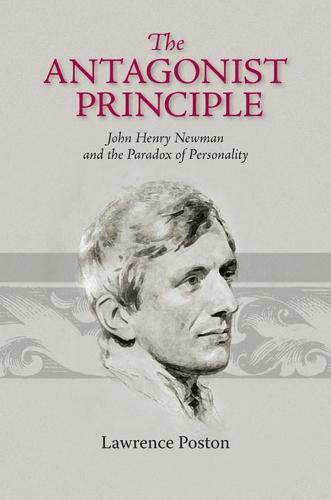Overview
The Antagonist Principle is a critical examination of the works and sometimes controversial public career of John Henry Newman (1801–1890), first as an Anglican and then as Victorian England’s most famous convert to Roman Catholicism at a time when such a conversion was not only a minority choice but in some quarters a deeply offensive one. Lawrence Poston adopts the idea of personality as his theme, not only in the modern sense of warring elements in one’s own temperament and relationships with others but also in a theological sense as a central premise of orthodox Trinitarian Christian doctrine. The principle of """"antagonism,"""" in the sense of opposition, Poston argues, activated Newman's imagination while simultaneously setting limits to his achievement, both as a spiritual leader and as a writer. The author draws on a wide variety of biographical, historical, literary, and theological scholarship to provide an “ethical” reading of Newman’s texts that seeks to offer a humane and complex portrait. Neither a biography nor a revelation of a life, this textual study of Newman’s development as a theologian in his published works and private correspondence attempts to resituate him as one of the most combative of the Victorian seekers. Though his spiritual quest took place on the far right of the religious spectrum in Victorian England, it nonetheless allied him with a number of other prominent figures of his generation as distinct from each other as Thomas Carlyle, John Stuart Mill, and Walter Pater. Avoiding both hagiography and iconoclasm, Poston aims to “see Newman whole.”
Full Product Details
Author: Lawrence Poston
Publisher: University of Virginia Press
Imprint: University of Virginia Press
Dimensions:
Width: 16.20cm
, Height: 2.20cm
, Length: 24.10cm
Weight: 0.575kg
ISBN: 9780813936338
ISBN 10: 0813936330
Pages: 288
Publication Date: 03 December 2014
Audience:
College/higher education
,
Postgraduate, Research & Scholarly
Format: Hardback
Publisher's Status: Active
Availability: In Print

This item will be ordered in for you from one of our suppliers. Upon receipt, we will promptly dispatch it out to you. For in store availability, please contact us.
Reviews
Poston's study of Newman's life, career, and writings in terms of his almost bipolar antagonism is both convincing and rewarding. A highly original, substantial, and excellent book.--Stephen Prickett, Regius Professor Emeritus, University of Glasgow, author of Romanticism and Religion: The Tradition of Coleridge and Wordsworth in the Victorian Church
In tracing the progression of Newman's significant writings, Poston softens the 'antagonist principle' that he sees Newman applying toward his own opponents. Poston critiques these polemical works, but only by measuring them against the various theologies through which Newman passed, the various saints he studied, and (most of all) his own deepest insights and intuitions. When Poston reaches the seminal books of the Catholic Newman the <i>Idea, </i> the <i>Apologia, </i> and especially the <i>Grammar</i> the tender care with which he develops these insights and intuitions enables him to reveal an inner coherence in all three works. Through them he presents Newman as a deep and sympathetic religious thinker who speaks both to his own world and to ours.</p>--David Goslee, Professor Emeritus, University of Tennessee, Knoxville, author of <i>Romanticism and the Anglican Newman</i>
Poston's analysis of Newman's literary works is outstanding, and consequently one is able to trace his early combative nature to a more balanced outlook as he matured. Readers with a background in literature or theology will appreciate the author's knowledge of Newman's writings and their relationship to his personality and its development.... Well-argued and objective. --Church History A valuable contribution... to Newman studies [and] to scholarship on Victorian religious prose in general, both for the balanced and insightful arguments herein and for the ground it opens for further research. --Prose Studies [T]he greatest importance of The Antagonist Principle: John Henry Newman and the Paradox of Personality lies in its convincing, sympathetic, yet clear-eyed explanation of the fundamentally coherent development of Newman's thought. At the same time, Poston, who wears his wide knowledge with grace and clarity, also makes us see often unexpected similarities and other connections between Newman, Carlyle, Tennyson, and Pater. --Victorian Web In tracing the progression of Newman's significant writings, Poston softens the 'antagonist principle' that he sees Newman applying toward his own opponents. Poston critiques these polemical works, but only by measuring them against the various theologies through which Newman passed, the various saints he studied, and (most of all) his own deepest insights and intuitions. When Poston reaches the seminal books of the Catholic Newman--the Idea, the Apologia, and especially the Grammar--the tender care with which he develops these insights and intuitions enables him to reveal an inner coherence in all three works. Through them he presents Newman as a deep and sympathetic religious thinker who speaks both to his own world and to ours. --David Goslee, Professor Emeritus, University of Tennessee, Knoxville, author of Romanticism and the Anglican Newman Poston's study of Newman's life, career, and writings in terms of his almost bipolar antagonism is both convincing and rewarding. A highly original, substantial, and excellent book. --Stephen Prickett, Regius Professor Emeritus, University of Glasgow, author of Romanticism and Religion: The Tradition of Coleridge and Wordsworth in the Victorian Church
Author Information
Lawrence Poston is Professor Emeritus of English at the University of Illinois at Chicago, USA.




